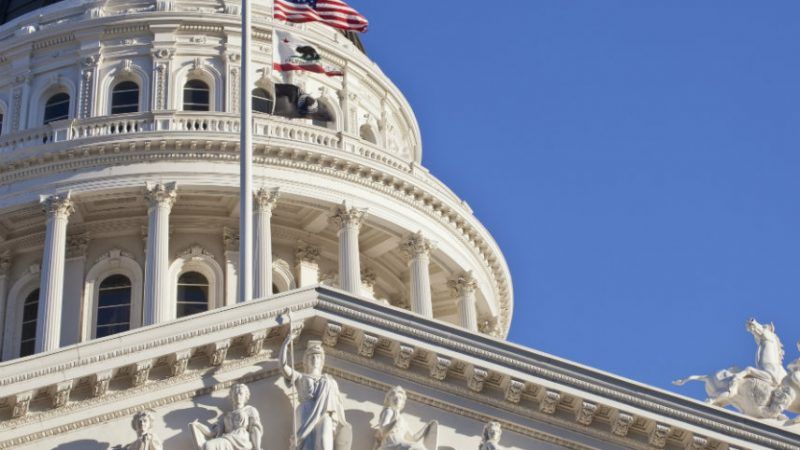The California Legislature Is Finally Out of Session. Here's How Much Damage It Did This Year.
No man's life, liberty or property are safe while the legislature is in session. That goes double in California.

It's that time of year.
The California Legislature has concluded its session and I can again publish one of my favorite quotations, from 19th century New York Judge Gideon Tucker: "No man's life, liberty or property are safe while the legislature is in session." At press time, we're still waiting to see how many liberty-destroying bills that Jerry Brown will actually sign into law, this being his (mercifully) last signings/vetoes after four total terms as governor.
Last year, Brown signed 859 measures into law. We'll see this year's final count in coming days. Not every bill is a bad one. But if you wonder why taxes keep going up, regulations keep piling up, and the tax code becomes more complex, you might think about the sheer volume of legislation that makes its way through both houses of the Legislature.
Rust never sleeps, but at least lawmakers are back in their districts. Unfortunately, the November general-election ballot is loaded with initiatives, which simply are proposed laws decided by voters. One of those would roll back the recent gas-tax hikes, but most float costly taxpayer-backed bonds and regulate our lives and property. Proposition 10, for instance, would remove state limits on local rent control. Hey, if we can't fix the housing crisis, why not make it worse?
This idea reinforces that simple, easy button "fixes" that exacerbate serious problems are as much the fault of voters and direct democracy as lawmakers. But the Legislature has the market cornered on posturing. Interest groups aren't going to spend millions of dollars to pass a ballot measure that doesn't do anything. But legislators will spend their time debating highfalutin measures that are solely about virtue-signaling.
Senate Bill 100 was one of those bills that gets national attention because of the audaciousness of its goals. Signed into law last week, it intends to prod California to buy 100 percent of its electricity from renewable sources by 2045. But it's typical legislative claptrap. Markets—not government mandates—are going to reduce the use of fossil fuels. Its deadline is 27 years away, which renders it meaningless.
In this case, the 100-percent figure is little more than a headline-grabbing goal. Technology doesn't exist yet to reach it, unless we want to cover the state's magnificent landscape with giant bird-killing wind turbines and solar panels. There are no penalties if the state doesn't reach the goal. The law will almost certainly raise electricity prices, especially in the hottest and poorest parts of the state. But it made for some great press conferences. It's about posturing over policy.
Same with the new law restricting money bail. That process was ripe for reform given that people who can't afford to post bail are far more likely to accept an unfavorable plea deal so they can get home to take of their kids, work and pay the rent. Unfortunately, this measure was amended in the final days of session to give judicial panels so much power that it's likely that people will languish in jail longer than they would have under the old system. It's commendable that criminal-justice reform has gotten the attention of the Legislature, but it's important that such reforms actually accomplish their stated goals. But the press conference was a good one.
When they're not posturing, lawmakers are busy raising taxes. Assembly Bill 1184 deals with transportation network companies, such as Uber and Lyft. Their emergence has been a bright spot in the state's economy, not to mention a great advance for consumers. San Francisco is the heart of that industry, yet this bill would let that city impose taxes on TNC rides originating there—and would impose taxes on the emerging autonomous vehicle and zero-emission vehicle industries.
As my colleague, Ian Adams, and I wrote in our letter to the governor urging a veto: "Autonomous vehicles offer great potential for improving the lives and mobility of Americans. Likewise, zero-emission vehicles offer great potential for reducing pollution. All such technologies should be encouraged, not hampered with additional taxes and regulations." California progressives don't understand that higher taxes work against their broader aims. In the end, such measures increase our cost of living, which is why the state tops the nation in poverty.
I'm only scraping the surface of hundreds of bills that passed out of the Legislature this year. A handful are good—such as a now-vetoed bill that would remove a conflict of interest during some county cause-of-death examinations (Senate Bill 1303). But more typically we see efforts such as Assembly Bill 1884 (signed by the governor), which forbids restaurants from handing out single-use plastic straws unless the customer first asks for one.
Given all of California's serious problems, it's hard to see the value of that nonsense. Then again, Judge Tucker would understand. We should all be happy the Legislature is out of session for a few months.
This column was first published by the Orange County Register.
Steven Greenhut is Western region director for the R Street Institute. He was a Register editorial writer from 1998 to 2009. Write to him at sgreenhut@rstreet.org.


Show Comments (33)